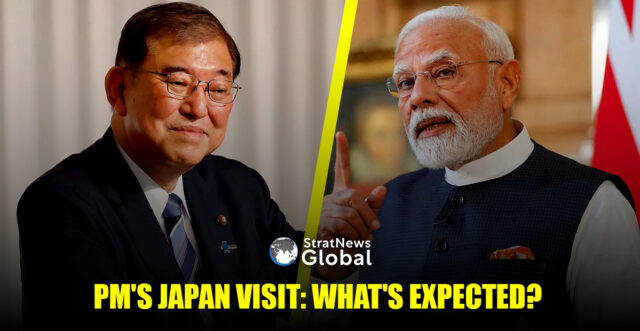Economic and strategic upgrade is on the cards as Prime Minister Narendra Modi heads to Japan later this week for the 15th India-Japan annual summit. The visit, set for August 29–30, will see the two countries unveil a broad-based agenda, with Tokyo expected to commit to a new investment target of 10 trillion yen (around $68 billion) for India over the next 10 years.
The announcement, expected during PM Modi’s first summit meeting with Japanese Prime Minister Shigeru Ishiba, would double the pledge made in 2022. This is being seen as a clear signal of Japan’s growing confidence in India’s long-term growth potential. The funds are expected to support major infrastructure, digital innovation and industrial projects across India.
While economic cooperation remains a cornerstone, the summit comes at a critical juncture geopolitically, as regional security concerns in the Indo-Pacific push both countries to strengthen their strategic and defence partnership.
High Stakes, Broad Agenda
The summit will cover a wide spectrum— from trade policy and technology partnerships to defence collaboration and regional diplomacy, say sources. India and Japan are expected to reaffirm their commitment to a “Special Strategic and Global Partnership”, with fresh emphasis on interoperability, defence technology co-development and supply chain resilience.
One milestone to be highlighted is the upcoming induction of advanced Unicorn Mast systems by the Indian Navy, a naval surveillance technology developed jointly by Japan and Bharat Electronics, representing growing defence R&D collaboration.
Trade, Market Access Under Review
A detailed review of the Comprehensive Economic Partnership Agreement (CEPA) is also on the cards, with both sides looking to iron out long-standing trade bottlenecks. India is likely to push for easier market access for pharmaceuticals and textiles. Japan may seek more robust investment safeguards and smoother regulatory pathways for its firms operating in India.
Also, the two countries will assess progress under the Japan-India Industrial Competitiveness Partnership (IJICP), launched in 2021 to support India’s industrial corridors and workforce skilling programmes.
Eye On Technology, Talent And Climate
Cooperation in advanced manufacturing, clean energy and semiconductors is expected to gain further momentum. Sources indicate that the leaders may announce new joint platforms in areas such as green hydrogen, AI and climate-resilient infrastructure — part of a shared commitment to sustainable growth.
Demographic complementarities are also coming into sharper focus. Japan’s aging workforce and India’s expanding talent pool offer opportunities for mobility agreements, student exchanges and collaboration in nursing, elderly care and technical fields.
Shifting Regional Landscape
The visit also serves a strategic purpose, taking place at a time of shifting power balances in the Indo-Pacific. Both India and Japan are likely to focus on the importance of freedom of navigation, peaceful resolution of disputes and adherence to international maritime law — especially in light of increasing tensions in the South and East China Seas.
The two leaders are also expected to discuss regional issues, as well as the upcoming QUAD Leaders’ Summit to be hosted in New Delhi later this year.
Broader Diplomatic Tour
Following his Japan visit, PM Modi is scheduled to travel to Tianjin, China to attend the Shanghai Cooperation Organisation (SCO) Summit. On the sidelines, bilateral talks with other attending leaders are expected, as India continues to strengthen its presence in multilateral regional forums.





